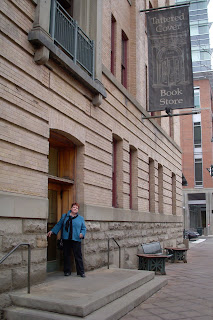
but most of the things they make it easier to do,
don't need to be done."
---Andy Rooney
 Friday 10:00 AM
Friday 10:00 AM There's a welcoming feel there, like you're coming back to a lodge after a day on the slopes.
There's a welcoming feel there, like you're coming back to a lodge after a day on the slopes. One task that morning was to search for examples of cover designs depicting a western or cowboy theme. Looking for inspiration is half the fun of a great bookstore. We sifted through pages, noting fonts, dropped caps, title pages, different layouts for appendixes, and how comfortable a book felt in our hands.
One task that morning was to search for examples of cover designs depicting a western or cowboy theme. Looking for inspiration is half the fun of a great bookstore. We sifted through pages, noting fonts, dropped caps, title pages, different layouts for appendixes, and how comfortable a book felt in our hands. "The great gift is the passion for reading.
"The great gift is the passion for reading. 
 This is the group of Heroes who have saved the day for us . . .all week long.
This is the group of Heroes who have saved the day for us . . .all week long.The next activity was for each of us to look in the index of our book and find spots that met these descriptions. In another fifteen minutes we had a list of places from Spain to Norway. The final exercise was to pinpoint the locations on a map of Europe, and see how they could be connected logically.
Art museums were plentiful; the Eiffel Tower was in Paris. Unique architecture was everywhere; the Anne Frank House was in Amsterdam. Those two cities met other criteria, too: the Metro, windmills, fabulous art museums, unique architecture and a famous cathedral. Both of them were big, cosmopolitan cities, and because they were only a few hours apart, yet vastly different in character, they were agreed upon quickly as musts.
At the next planning session, we followed the same procedure, and narrowed our other choices down to London, Switzerland, Germany, Austria, Italy and Hungary. Our transportation needs, plus one of the goals, could be met if we traveled by train. A little research showed that Eurail passes were the best option, but they didn't cover tickets in England, Hungary, or parts of Switzerland.
Looking at a calendar, we counted our days and estimated the time we wanted to spend in our selected countries. Our itinerary was impossible to do in three weeks. When we started to cut it down, the places that would cost extra got eliminated first: London, Budapest, and Switzerland. Wait...we really wanted to go to Switzerland! It was decided that it was too important to cut, and worth the extra fare, so we added it back in.
The trip was starting to fall into place. When we checked airfares we found Amsterdam to be the cheapest place to fly in and out of. Perfect! But it would take a couple of precious days to get back to Holland at the end of the trip. If we flew home from Munich the cost would be a little more, but we wouldn't have to backtrack. We made that adjustment. Now we had a flight plan to work around.
It was exciting to mark up our maps and discover the routes that would work. (In the end we had extended ourselves too far. While we were traveling we decided to save Italy for another time, and enjoy the ideal weather and cheap hotel we discovered during an unplanned train stop in Feldkirch, Austria. More on flexibility in another post.)
Van Gogh and Anne Frank were topics at the dinner table. Memorizing foreign phrases became a contest. Knowing where we were going, and why, and who it was important to, made saving our money easier. As we had to make decisions of places to add or subtract we became more cooperative. The whole process nourished our enthusiasm.
What we wanted to have happen was already happening!
 Details in the archives
Details in the archives"People disappear when they die. Their voice, their laughter, the warmth of their breath. Their flesh. Eventually their bones. All living memory of them ceases. This is both dreadful and natural. Yet for some, there is an exception to this annihilation. For in books they continue to exist. We can rediscover them...
"As one tends the graves of the dead, so I read the books...I allow the voices of the forgotten dead to resonate inside my head. Do they sense it? Does a pinprick of light appear...is their soul stirred by the feather touch of another mind reading about them? I do hope so."---from The Thirteenth Tale
 Amerheed @ 1986
Amerheed @ 1986 Heed and Min sick for Christmas Eve 1986
Heed and Min sick for Christmas Eve 1986
 Oma at the sista sleepover 2009
Oma at the sista sleepover 2009 Where my dreams take me . . .
Where my dreams take me . . . Me and my dad, 1951
Me and my dad, 1951 From Miss Potter
From Miss Potter On the road with Oma and Opa.
On the road with Oma and Opa. The Lion, Shrewsbury, 2004.
The Lion, Shrewsbury, 2004.